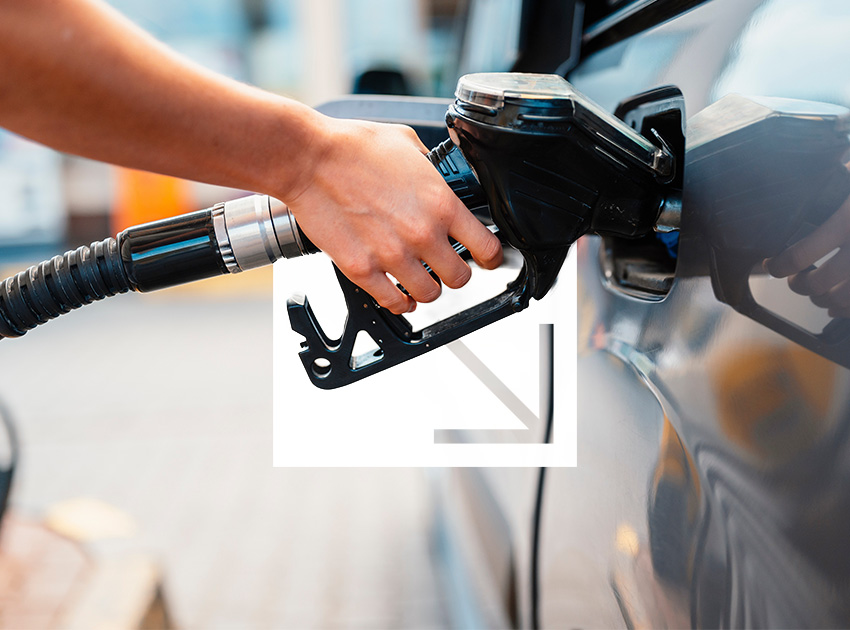We all develop our own driving styles but many behaviours we pick up on the road could actually be causing us to increase the number of times we have to fill up our cars. Whether you regularly crawl through stop/start traffic or drive around with a boot full on forgotten clutter, small changes can make a big difference.
If you’re looking to save fuel in your own vehicle or when hiring a car alongside our excess reimbursement insurance for hire cars, this guide covers everything you need to know.
1. Slow Down
When you drive at higher speeds your engine has to work harder to counteract the dramatically increased air resistance – this means your car is burning more fuel. Whilst it might be tempting to push towards the maximum legal limit on the motorway, maintaining a slightly lower, more consistent speed will reduce engine RPM and improve efficiency.
2. Use Cruise Control Wisely
Cruise control is a great way of saving fuel on flat roads such as motorways as it prevents unnecessary acceleration and deceleration.
That being said, it’s less efficient to use cruise control on hilly routes. When descending slopes, cruise control often continues to apply power because it can’t anticipate gradient changes. This ultimately increases fuel use.
3. Brake and Accelerate Gently
Sudden braking or rapid acceleration wasted fuel. You should instead let the car slow naturally using engine braking when approaching stop. When setting off again, accelerate smoothly. These adjustments may feel small but they help reduce fuel consumption over time.
4. Combine Your Trips
Engines are most efficient when they’re warm. This means that running all of your small errands in one long trip is more economical than making separate short journey from a cold start, particularly in colder weather.
5. Lighten the Load
Every extra kilogram in your car requires additional fuel to move it. Essential items like a spare tyre and an ice scraper are fine, it’s things like unused holiday suitcases or long-forgotten sports equipment that only adds unnecessary weight. Take the time to clear out your boot and your engine won’t have to work as hard.
6. Be Smart About Using the Air Con
Air conditioning does use fuel but sometimes less than open windows. At low speeds in built up areas open windows are more efficient; at higher speeds on dual carriageways and motorways open windows increase drag which means that switching to aircon is normally the more economical choice.
7. Keep Your Tyres Properly Inflated
Under-inflated tyres create more rolling resistance, meaning your car needs more power and fuel to maintain speed.
Make sure you:
- Check tyre pressures regularly
- Adjust pressure to the higher end of the recommended range when carrying extra passengers or weight
- Fix low pressure warnings promptly to avoid premature wear or blow outs
8. Get Your Vehicle Serviced
Routine servicing keeps your engine running efficiently. Tasks like removing sludge, replacing worn components and keeping filters clean helps ensure your engine performs optimally and uses fuel more effectively.
9. Drive at Quieter Times
Heavy traffic means more braking, accelerating and idling – all of which burns more fuel. When possible, plan journeys for quieter periods so you can maintain steady speeds and make better use of cruise control.
FAQs
Fuel use peaks during acceleration. Hard acceleration might feel satisfying but it will increase your fuel expenditure significantly over time.
Lots of people waste fuel by driving on under-inflated tyres as they overlook their vehicle’s recommended psi. Lower tyre pressure increases resistance and forces the engine to work harder thus burning more fuel.
On flat motorways, cruise control generally reduces fuel consumption by maintaining a steady speed. However on hills it can increase fuel usage because the system cannot anticipate slope changes and will often apply more power than needed.
Yes, but a smaller amount than you might think. Car heaters primarily use waste heat from the engine. This means that when the engine is cold, you’ll feel cold air until it warms up. However once it does heat up maintaining cabin warmth has minimal impact on fuel use.
Viral ‘hacks’ suggesting that toothpaste improves fuel efficiency are false and dangerous. Toothpaste can clog fuel filters, lines and injectors; reduce engine power; increase emissions; damage spark plugs, exhaust systems, valves, pistons, cylinder walls and fuel pumps.
Toothpaste belongs in your bathroom, not in the fuel tank.
Final Thoughts
Adopting more efficient driving habits will save on fuel but also reduce wear and tear. If you’re hiring a car, combining these techniques with our car hire excess insurance will provide even more peace of mind that your wallet is protected. Whilst you to reduce your fuel consumption, let us reduce your excess.


Comments are closed